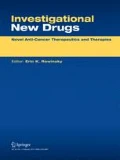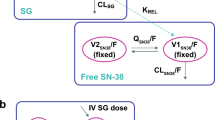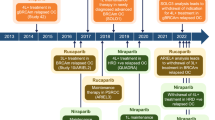Summary
Background This phase II open-label, multicenter study evaluated the efficacy, safety, and tolerability of TAK-264 in previously treated patients with advanced or metastatic pancreatic adenocarcinoma expressing guanylyl cyclase C (GCC). Methods Patients with advanced or metastatic pancreatic adenocarcinoma expressing GCC (H-score ≥ 10) received TAK-264 1.8 mg/kg on day 1 of a 21-day cycle as a 30-min intravenous infusion for up to 1 year or until disease progression or unacceptable toxicity. The primary objective was overall response rate (ORR [complete response + partial response (PR)]). Secondary objectives included evaluations of the safety and pharmacokinetic profile of TAK-264 (NCT02202785). Results 43 patients were enrolled and treated with 1.8 mg/kg TAK-264: 11, 15, and 17 patients with low, intermediate, and high GCC expression, respectively. Median number of treatment cycles received was two (range 1–10). The ORR was 3%, including one patient with intermediate GCC expression who achieved a PR. All patients experienced ≥1 adverse events (AE). The majority of patients experienced grade 1/2 AEs affecting the gastrointestinal tract. Fifteen (35%) patients experienced ≥grade 3 drug-related AEs; five (12%) patients had a serious AE. The most common (≥10% of patients) all-grade drug-related AEs were nausea (33%), fatigue (28%), neutropenia (23%), decreased appetite (23%), vomiting (16%), asthenia (16%), and alopecia (14%). Conclusions TAK-264 demonstrated a manageable safety profile; however, the low efficacy of TAK-264 observed in this study did not support further clinical investigation.

Similar content being viewed by others
References
Peters C, Brown S (2015) Antibody-drug conjugates as novel anti-cancer chemotherapeutics. Biosci Rep 35(4). doi:10.1042/BSR20150089
Tsuchikama K, An Z (2016) Antibody-drug conjugates: recent advances in conjugation and linker chemistries. Protein Cell. doi:10.1007/s13238-016-0323-0
Diamantis N, Banerji U (2016) Antibody-drug conjugates--an emerging class of cancer treatment. Br J Cancer 114(4):362–367. doi:10.1038/bjc.2015.435
US Food and Drug Administration: Brentuximab Vedotin (2017). Available at: https://www.fda.gov/AboutFDA/CentersOffices/OfficeofMedicalProductsandTobacco/CDER/ucm268969.htm. Accessed March 2017
Genentech USA (2016) KADCYLA prescribing information Available at: http://www.gene.com/download/pdf/kadcyla_prescribing.pdf. Accessed March 2017
Ferlay J, Soerjoataram I, Ervik M, Dikshit R, Eser S, Mathers C, Rebelo M, Parkin D, Forman D, Bray F (2014) GLOBOCAN 2012 v1.1, cancer incidence and mortality worldwide: IARC CancerBase no. 11 International Agency for Research on Cancer; 2014. http://www.wcrf.org/int/cancer-facts-figures/data-specific-cancers/pancreatic-cancer-statistics. Accessed March 2017
Network PCA (2016) Pancreatic Cancer Facts 2016. https://www.pancan.org/wp-content/uploads/2016/02/2016-GAA-PC-Facts.pdf. Accessed March 2017
Lawrence B, Findlay M (2010) Systemic therapy for metastatic pancreatic adenocarcinoma. Ther Adv Med Oncol 2(2):85–106. doi:10.1177/1758834009357188
Conroy T, Desseigne F, Ychou M, Bouche O, Guimbaud R, Becouarn Y, Adenis A, Raoul JL, Gourgou-Bourgade S, de la Fouchardiere C, Bennouna J, Bachet JB, Khemissa-Akouz F, Pere-Verge D, Delbaldo C, Assenat E, Chauffert B, Michel P, Montoto-Grillot C, Ducreux M, Groupe Tumeurs Digestives of U, Intergroup P (2011) FOLFIRINOX versus gemcitabine for metastatic pancreatic cancer. N Engl J Med 364(19):1817–1825. doi:10.1056/NEJMoa1011923
Von Hoff DD, Ervin T, Arena FP, Chiorean EG, Infante J, Moore M, Seay T, Tjulandin SA, Ma WW, Saleh MN, Harris M, Reni M, Dowden S, Laheru D, Bahary N, Ramanathan RK, Tabernero J, Hidalgo M, Goldstein D, Van Cutsem E, Wei X, Iglesias J, Renschler MF (2013) Increased survival in pancreatic cancer with nabpaclitaxel plus gemcitabine. N Engl J Med 369(18):1691–1703. doi:10.1056/NEJMoa1304369
John M, Wiedenmann B, Kruhoffer M, Adermann K, Ankorina-Stark I, Schlatter E, Ahnert-Hilger G, Forssmann WG, Kuhn M (1998) Guanylin stimulates regulated secretion from human neuroendocrine pancreatic cells. Gastroenterology 114(4):791–797
Kloeters O, Friess H, Giese N, Buechler MW, Cetin Y, Kulaksiz H (2008) Uroguanylin inhibits proliferation of pancreatic cancer cells. Scand J Gastroenterol 43(4):447–455. doi:10.1080/00365520701746378
Park J, Schulz S, Haaf J, Kairys JC, Waldman SA (2002) Ectopic expression of guanylyl cyclase C in adenocarcinomas of the esophagus and stomach. Cancer Epidemiol Biomark Prev 11(8):739–744
Carrithers SL, Parkinson SJ, Goldstein S, Park P, Robertson DC, Waldman SA (1994) Escherichia coli Heat-stable toxin receptors in human colonic tumors. Gastroenterology 107(6):1653–1661
Carrithers SL, Parkinson SJ, Goldstein SD, Park PK, Urbanski RW, Waldman SA (1996) Escherichia coli Heat-stable enterotoxin receptors. A novel marker for colorectal tumors. Dis Colon Rectum 39(2):171–181
Buc E, Vartanian MD, Darcha C, Dechelotte P, Pezet D (2005) Guanylyl cyclase C as a reliable immunohistochemical marker and its ligand Escherichia coli heat-stable enterotoxin as a potential protein-delivering vehicle for colorectal cancer cells. Eur J Cancer 41(11):1618–1627. doi:10.1016/j.ejca.2005.02.031
Camci C, Sahin A, Sevinc A, Kalender ME, Oztuzcu S, Sever ON, Ozkara E, Demiryurek AT (2011) Peripheral blood guanylyl cyclase c (GCC) expressions are associated with prognostic parameters and response to therapy in colorectal cancer patients. Tumour Biol 32(6):1265–1270. doi:10.1007/s13277-011-0231-0
Winn B, Tavares R, Matoso A, Noble L, Fanion J, Waldman SA, Resnick MB (2010) Expression of the intestinal biomarkers guanylyl cyclase C and CDX2 in poorly differentiated colorectal carcinomas. Hum Pathol 41(1):123–128. doi:10.1016/j.humpath.2009.07.009
Carrithers SL, Barber MT, Biswas S, Parkinson SJ, Park PK, Goldstein SD, Waldman SA (1996) Guanylyl cyclase C is a selective marker for metastatic colorectal tumors in human extraintestinal tissues. Proc Natl Acad Sci U S A 93(25):14827–14832
Zhang J, Gallery M, Wyant T, Stringer B, Manfredi M, Danaee H, Veiby P (2013) Abstract PR12: MLN0264, an investigational, first-in-class antibody-drug conjugate (ADC) targeting guanylyl cyclase C (GCC), demonstrates antitumor activity alone and in combination with gemcitabine in human pancreatic cancer xenograft models expressing GCC. Mol Cancer Ther 12(11 Supplement):PR12–PR12. doi:10.1158/1535-7163.targ-13-pr12
Hyslop T, Waldman SA (2013) Guanylyl cyclase C as a biomarker in colorectal cancer. Biomark Med 7(1):159–167. doi:10.2217/bmm.12.90
Li P, Schulz S, Bombonati A, Palazzo JP, Hyslop TM, Xu Y, Baran AA, Siracusa LD, Pitari GM, Waldman SA (2007) Guanylyl cyclase C suppresses intestinal tumorigenesis by restricting proliferation and maintaining genomic integrity. Gastroenterology 133(2):599–607. doi:10.1053/j.gastro.2007.05.052
Vaandrager AB (2002) Structure and function of the heat-stable enterotoxin receptor/guanylyl cyclase C. Mol Cell Biochem 230(1–2):73–83
Wolfe HR, Mendizabal M, Lleong E, Cuthbertson A, Desai V, Pullan S, Fujii DK, Morrison M, Pither R, Waldman SA (2002) In vivo imaging of human colon cancer xenografts in immunodeficient mice using a guanylyl cyclase C--specific ligand. J Nucl Med 43(3):392–399
Almhanna K, Kalebic T, Cruz C, Faris JE, Ryan DP, Jung JA, Wyant T, Fasanmade A, Messersmith WA, Rodon J (2016) Phase I study of the investigational anti-guanylyl cyclase antibody-drug conjugate TAK-264 (MLN0264) in adult patients with advanced gastrointestinal malignancies. Clin Cancer Res. doi:10.1158/1078-0432.ccr-15-2474
Eisenhauer EA, Therasse P, Bogaerts J, Schwartz LH, Sargent D, Ford R, Dancey J, Arbuck S, Gwyther S, Mooney M, Rubinstein L, Shankar L, Dodd L, Kaplan R, Lacombe D, Verweij J (2009) New response evaluation criteria in solid tumours: revised RECIST guideline (version 1.1). Eur J Cancer 45(2):228–247. doi:10.1016/j.ejca.2008.10.026
Perez HL, Cardarelli PM, Deshpande S, Gangwar S, Schroeder GM, Vite GD, Borzilleri RM (2014) Antibody-drug conjugates: current status and future directions. Drug Discov Today 19(7):869–881. doi:10.1016/j.drudis.2013.11.004
Kim EG, Kim KM (2015) Strategies and advancement in antibody-drug conjugate optimization for targeted cancer therapeutics. Biomol Ther (Seoul) 23(6):493–509. doi:10.4062/biomolther.2015.116
Younes A, Bartlett NL, Leonard JP, Kennedy DA, Lynch CM, Sievers EL, Forero-Torres A (2010) Brentuximab vedotin (SGN-35) for relapsed CD30-positive lymphomas. N Engl J Med 363(19):1812–1821. doi:10.1056/NEJMoa1002965
Acknowledgements
The authors acknowledge Sabah Farooq of FireKite, an Ashfield company, part of UDG Healthcare plc, for writing support during the development of this manuscript, which was funded by Millennium Pharmaceuticals, Inc. ADC technology was licensed from Seattle Genetics, Inc.
Author information
Authors and Affiliations
Corresponding author
Ethics declarations
Conflicts of interest
Khaldoun Almhanna: Lilly advisor/board member, Genentech Speaker’s bureau. Jason Faris: Current employee of Novartis; consultant for Merrimack Pharmaceuticals and N-of-One Therapeutics; research for Exelixis, Millennium, Agios, and Roche/Genentech. Richard A. Hubner: Advisory Board payments from Celgene and BTG. Jaime Feliu: Advisor/honoraria for Sanofi, Amgen, Bayer, Lilly. Peter Enzinger; Speaker’s bureau for Merck esophageal cancer. Devalingham Mahalingham: Advisory board for Bayer, Baxalta, and Genspera; Speaker bureau for Genentech, Amgen, and Bayer. Wells Messersmith: Research support from Millennium. Huyuan Yang, Adedigbo Fasanmade, Hadi Danaee, Thea Kalebic: Employees of Millennium. David Wright, Teresa Macarulla Mercade, Jean-Luc Van Laethem, Antonio Cubillo Gracian, Carmen Guillen-Ponce, Carolina Muriel Lopez, Johanna Bendell, Alain Bols, Naureen Starling: nothing to disclose.
Funding
This study was funded by Millennium Pharmaceuticals Inc., a wholly owned subsidiary of Takeda Pharmaceutical Company Limited.
Ethical approval
The institutional review boards and independent ethics committees reviewed all appropriate study documentation to safeguard the rights, safety, and well-being of the patients. Written informed consent was obtained from each patient prior to initiating study participation, in compliance with International Conference on Harmonisation-Good Clinical Practices guidelines, the principles set out in the Declaration of Helsinki, and all applicable regulatory requirements.
Informed consent
The study was conducted in compliance with the protocol, Good Clinical Practices, applicable regulatory requirements, and International Conference on Harmonisation guidelines.
Rights and permissions
About this article
Cite this article
Almhanna, K., Wright, D., Mercade, T.M. et al. A phase II study of antibody-drug conjugate, TAK-264 (MLN0264) in previously treated patients with advanced or metastatic pancreatic adenocarcinoma expressing guanylyl cyclase C. Invest New Drugs 35, 634–641 (2017). https://doi.org/10.1007/s10637-017-0473-9
Received:
Accepted:
Published:
Issue Date:
DOI: https://doi.org/10.1007/s10637-017-0473-9




